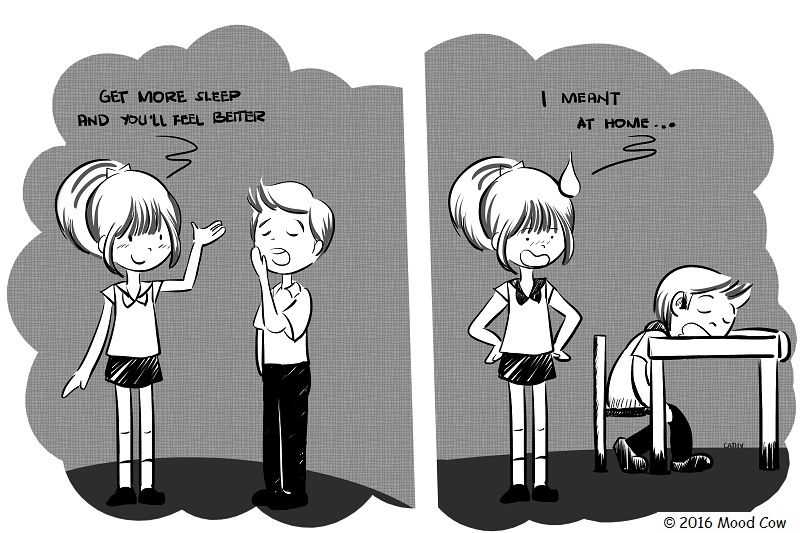Home > Mental care actions > #5 Sleep
#5 Sleep
Adequate sleep improves health, productivity, quality of life, and safety.

Scientific evidence
A significant number of scientific studies have examined the benefits of sleep and the risks associated with not getting enough of it. Sleep is a major public health issue because of an increasing number of chronic insomnia cases, especially for children and teenagers.
In June 2016, to prevent the health risks linked to insufficient sleep, the American Academy of Sleep Medicine (AASM) released its official consensus recommendations for the amount of sleep necessary. [1]
- Infants 4 to 12 months: 12 to 16 hours per 24 hours (including naps).
- Children 1 to 2 years: 11 to 14 hours per 24 hours (including naps).
- Children 3 to 5 years: 10 to 13 hours per 24 hours (including naps).
- Children 6 to 12 years: 9 to 12 hours per 24 hours.
- Teenagers 13 to 18 years: 8 to 10 hours per 24 hours.
Adults 18 to 65+ years: 7 to 9 hours per 24 hours on a regular basis. [2]
[1] Paruthi S, Brooks LJ, D'Ambrosio C, Hall WA, Kotagal S, Lloyd RM, Malow BA, Maski K, Nichols C, Quan SF, Rosen CL, Troester MM, Wise MS. Recommended amount of sleep for pediatric populations: a consensus statement of the American Academy of Sleep Medicine. J Clin Sleep Med 2016;12(6):785–786. Link
[2] Hirshkowitz, M. et al. National Sleep Foundation’s sleep time duration recommendations: methodology and results summary. Sleep Health: Journal of the National Sleep Foundation. 2015;1:40-43. Link
[3] Institute of Medicine, Committee on Sleep Medicine and Research. Sleep disorders and sleep deprivation: An unmet public health problem. Washington: National Academies Press; 2006. Link
[4] Centers for Disease Control and Prevention, Epidemiology Program Office. Perceived insufficient rest or sleep among adults: United States, 2008. MMWR. 2009 Oct 30;58(42):1175-9. Link
[5] Schutte-Rodin S, Broch L, Buysse D, Dorsey C, Sateia M. Clinical Guideline for the Evaluation and Management of Chronic Insomnia in Adults. Journal of Clinical Sleep Medicine: Official Publication of the American Academy of Sleep Medicine. 2008;4(5):487-504. Link
What you can do with this knowledge
- Use the recommended sleep hours as a guideline to establish your daily regularity.
- A daily routine of hydration, a balanced diet, exercise, and sunlight can help you fall asleep and stay asleep better.
- If you work shifts that interfere with your sleep, or if you have problems falling asleep or staying asleep through the night, consult your doctor for advice to improve your sleep. Doctors are familiar with clinical guidelines for chronic insomnia. [3]
Caution
Ask your doctor before taking any medications or supplements, even if they don't require prescriptions. Any chemical substance will interact with food, other medications or underlying medical conditions.
Good reads
- Read this quick guide from Mayo Clinic before you try any medication.
- Another good read on sleeping pills.
- A well-written article on sleep problems and mental health.
- Sleep and mental health by Harvard Medical School: 2009 Link
- For further exploration, use the search keywords: sleep health
- Sleep aids: Understand over-the-counter options by Mayo Clinic: 2014. Link
- Sleeping Pills & Natural Sleep Aids: What’s Best for You? by Melinda Smith, Lawrence Robinson, and Robert Segal: 2016. Link

